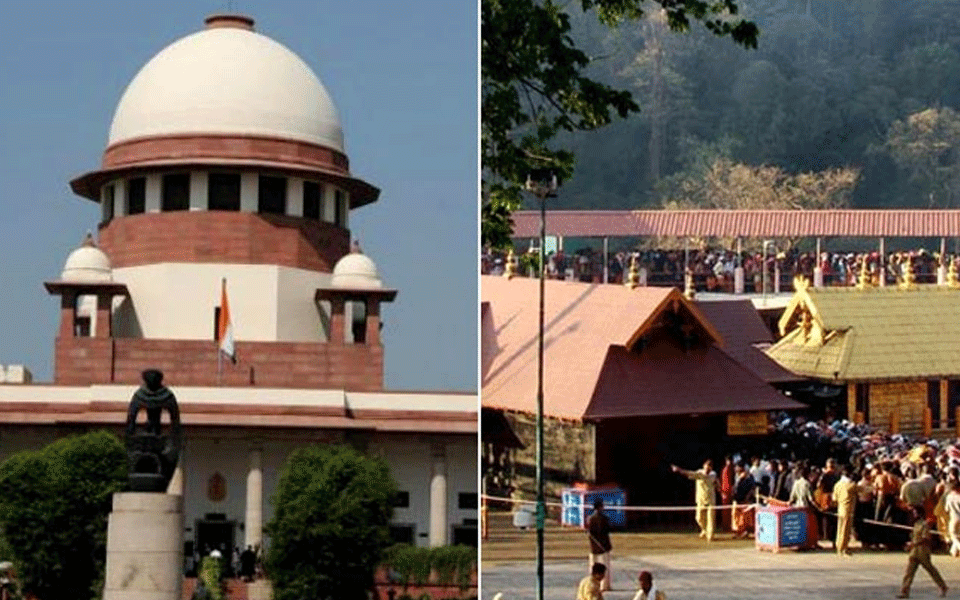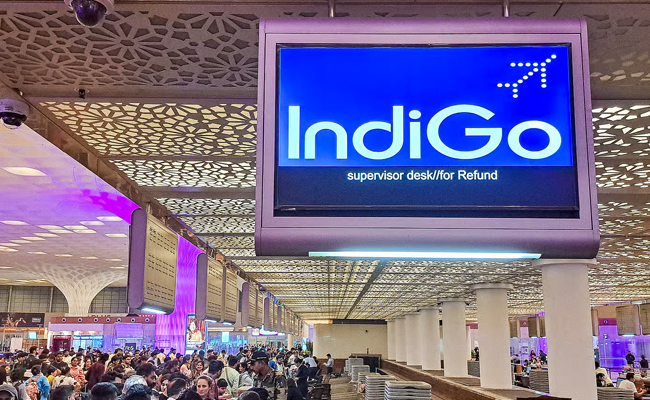New Delhi, July 17: The Supreme Court on Tuesday began hearing on whether prohibiting the entry of women in Kerala's Sabarimala temple on grounds of biological factors was discriminatory and violative of the constitution.
Article 14 guarantees the right to equality, Article 15 prohibits discrimination on grounds of religion, race, caste, sex or place of birth, and Article 17 abolishes untouchability and forbids its practice.
The constitution bench comprising of Chief Justice Dipak Misra, Justice Rohinton Fali Nariman, Justice A.M. Khanwilkar, Justice D.Y. Chandrachud and Justice Indu Malhotra will address four questions framed by a three judge bench while referring the matter to a five judge constitution bench on October 13, 2017.
The petitioner -- the Indian Young Lawyers Association -- has challenged the 800-year-old practice of prohibiting the entry of women into the famed Lord Ayyappan Temple.
The PIL has sought direction to the Kerala government, the Travancore Devaswom Board, Chief Thanthri (priest) of Sabarimala Temple and the District Magistrate of Pathanamthitta to ensure entry of female devotees between the age group of 10-50.
Appearing for the petitioner, counsel Ravi Prakash Gupta told the court the restrictions on the entry of women in Sabarimala temple is not the essence of their religious affairs as discrimination on the entry of women in the temple is "neither a ritual nor a ceremony associated with Hindu religion".
Gupta said: "Mere sight of a woman does not affect anybody's celibacy, if one has take oath of it, otherwise such oath has no meaning."
The constitution bench will examine whether the exclusion of women based on biological factors amounts to "discrimination" and violates the very core of Articles 14, 15 and 17 and not protected by 'morality' as used in Articles 25 and 26 of the Constitution.
In the coming days, the court will hear arguments focusing on whether excluding women (in the age group of 10-50 years) constitutes an "essential religious practice" under Article 25, and "whether a religious institution can assert a claim in that regard under the umbrella of right to manage its own affairs in the matters of religion?"
Besides, the court will address the question whether "Ayyappa Temple has a denominational character" and if it was permissible for religious denomination managed by a statutory board and is funded by the Kerala and Tamil Nadu governments to indulge in practices "violating the constitutional principles/morality".
Another question to be addressed is whether Rule 3 of Kerala Hindu Places of Public Worship (Authorisation of Entry) Rules permits 'religious denomination' to ban entry of women between the age of 10-50 years.
If Rule 3 permitted the ban on the entry of women in Sabarimala temple, then would it not be foul of Articles 14 and 15(3), which says that nothing in the provision prohibiting discrimination on grounds of religion, race, caste, sex or place of birth shall prevent the state "from making any special provision for women and children".
The constitution bench will also examine whether Rule 3(b) is ultra vires of the Kerala Hindu Places of Public Worship (Authorisation of Entry) Act, 1965, and if not, is it violative of the fundamental rights.
The court on Tuesday asked the petitioner and others to conclude their arguments on Wednesday.
Let the Truth be known. If you read VB and like VB, please be a VB Supporter and Help us deliver the Truth to one and all.
Bengaluru (PTI): The Karnataka government has issued directions to municipal corporations across the state to regulate and prohibit feeding pigeons in public places, citing serious public health concerns.
Deputy Secretary to Government V Lakshmikanth has written to the Urban Development Department requesting it to issue directions to the Greater Bengaluru Authority (GBA) and all municipal corporations to take immediate steps to implement the measures.
In an official note dated December 16 issued by the Health and Family Welfare Department and released to the media on Wednesday, the department said uncontrolled feeding of pigeons in public places has resulted in large congregations of birds, excessive droppings and serious health concerns, particularly respiratory illnesses linked to prolonged exposure to pigeon droppings and feathers such as hypersensitivity pneumonitis and other lung diseases.
ALSO READ: Chinese GPS tracker found on seagull near Karwar Coast
"The commissioner, the Greater Bengaluru Authority and the Commissioners and chief officers of other municipal corporations shall take necessary action to mitigate the causes of dangerous disease spread by pigeon and enforce specified guidelines in their respective jurisdiction," the note said.
According to the department, these include a prohibition on feeding pigeons or causing pigeons to be fed in areas where it may cause nuisance or pose a health hazard to the public. Pigeon feeding shall be permitted only in designated areas in a controlled manner, subject to certain conditions.
"The designated areas may be selected in consultation with stakeholders. The responsibility for upkeep of the designated areas and compliance to the directions shall be taken up by some charitable organisation or an NGO. The feeding in designated areas shall be permitted only for some limited hours in the day," it said.
The note further stated that authorised officers of local authorities shall issue on-the-spot warnings and may impose fines for violation of the order, or lodge complaints to prosecute offenders under Sections 271 (Negligent act likely to spread infection of disease dangerous to life) and 272 (Malignant act likely to spread infection of disease dangerous to life) of the Bharatiya Nyaya Sanhita.
It also directed local authorities to conduct public awareness campaigns, including the display of signboards, banners and digital messages, explaining the health hazards associated with pigeon droppings and feathers, the content of the regulatory directions and penalties for violations, and alternative humane methods of bird conservation that do not endanger public health.





